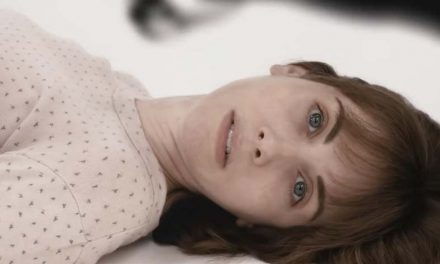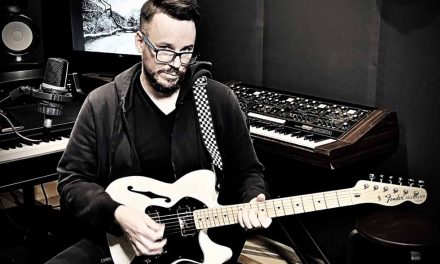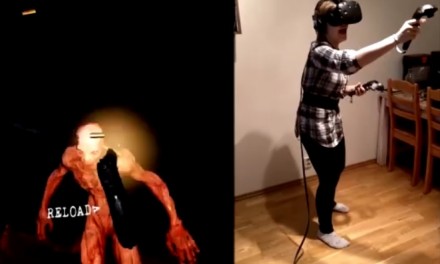Heaven of Horror recently spoke with composer Adam Langston about his latest film, Gravitas Ventures’ I’ll Play Mother, his work on Alien: Covenant, and more.
The I’ll Play Mother synopsis reads: After the death of their birth mother, two young children are placed in the care of prospective adopter parents, however, it’s not long before the new family begin to question if something more sinister is at play.
I’ll Play Mother is available on VOD now.
What first attracted you to the I’ll Play Mother script?
I was attracted to the idea after a brief discussion with Brad Watson, the director, and I never actually saw the script. I thought the set-up of two bereaved young siblings being adopted, and an escalation of sinister occurrences, sounded like an intense and emotional concept.
The main attraction initially was working with Brad again, who is a wonderful director, and someone whose work I connect with in many ways, from his use of music to his editing and shot choices.
Did you score the film in chronological order or did you save the most challenging scenes for last, after being fully engulfed with the film?
I went almost entirely in chronological order, which seemed to work for this film. That’s not always the case. But the very first piece of music I did was one that recurs a few times during the film, developing each time to reflect the increasingly dire situation the characters find themselves in. This was in fact one of the most challenging cues, or at least, it took the longest time to do.
I think in general, deliberately saving the most challenging scenes for last could be risky, because there may not be much time left by then. But it’s taken some very helpful people to point that out to me!

What would you say was the most challenging scene to score?
I’d say it was the ‘Hangman’ scene, where the decorating of the Christmas tree is interrupted by a game of hangman by one of the children, while upstairs the younger child is in danger.
There’s a lot going on, and I had to almost score it twice since there are two cues happening at once. There is some music suggestive of Christmas in the scene, which implies the characters can hear, and there is also the gradually encroaching dark underscore.
Discovering how dark to make the music and how soon to do that, and balancing that dark material with the Christmas music, was a very interesting challenge. It needed to build to a climax and feel natural while fitting with the picture. It took a while but was satisfying to do.
Some composers have been known to use “found objects” as instruments. Did you do anything like that with I’ll Play Mother?
There are a few ‘found object’ sounds in the score, but used in subtle ways, rather than as a defining characteristic of the music. Brad was not looking for an ‘experimental’ score for the most part, so these sounds are woven into the orchestral sound to hint at certain elements of the story.
Some of these objects were recorded by the brilliant Hainbach, such as old comms signal equipment, which was useful for hinting at voices from the past, and collected scrap heap ‘totems’ which I used for eerie metallic scrapes and distant vibrations.
Is there another horror sub-genre you would like to work in?
One of the most frightening films I ever watched was Primer by Shane Carruth, which to those who’ve seen it may sound like a strange thing to say, and it certainly isn’t a horror film. But it’s a very low-fi and ‘realistic’ depiction of time travel and, for me, evokes the absolute existential terror arising from the resulting doubles/doppelgangers.
I think that Us by Jordan Peele, and Tenet by Christopher Nolan, also deal with some of these types of concepts, in very different ways of course. All this to say, that time travel would be an awesome sub-genre to do, whether or not it’s horror. But more horror-related, I’d love to work on something with Marcus Dunstan, who seems awesome and makes really cool movies, and Zach Strauss, because I loved his short film Bad Peter.
I’ll Play Mother director Brad Watson is also a composer himself. How did his understanding of music help guide you?
Brad is a fantastic guide. He’s a director, editor, composer, and so his deep understanding of film music comes from several aspects. Ultimately, he knows what he wants from the score, and communicates it clearly, which gives me confidence that I am not spending lots of time on a cue which will be completely wrong for him!
He also is brilliant at knowing where to use music and where not to, and he doesn’t overuse music. There is always a clear reason for the music to be there, which helps it to feel intentional and motivated. This all adds to the fun of the process too. We both love film scores, and it’s a joy to see what the score can contribute, from the subtlest hints of disquiet to full-on emotional turmoil!
On the film’s soundtrack, there are a few singers featured, Megan Lockhurst and Cheryl Neve. Did you collaborate with them directly?
I did not, but it would be fun to do that in the future. They contributed songs to the film, and Megan is also in the film, so I was certainly reacting to her performance. She’s such a great actress, and she and Cheryl have done projects together before, so their work just clicks and sounds natural. As source music, which is music that the characters can hear in a scene, it needs to sound authentic and not out of place. They did a fantastic job.
Do you have any favorite behind-the-scenes moments from working on I’ll Play Mother?
It was really lovely going to the cast and crew screening and meeting some of the other people who worked on the film. It reinforces the feeling that you’re part of something bigger since composing can often be quite a solitary process.
Meeting Susanne Wuest was amazing, particularly since I’d seen her in Goodnight Mommy. Similarly, Dennis Madden, the brilliant director of photography, and Ben Charles Edwards, the producer who also came up with the idea for the film. Mark Summers the casting director, lots of production people from the set… it’s really great to pick up other people’s perspectives on things. That’s about as far ‘behind the scenes’ as I went on this film – the rest of the time I was in a room composing!
You orchestrated the score for Alien: Covenant. What were your involvements like with the film’s composer Jed Kurzel? How did it feel working on such an iconic franchise?
Jed wrote a brilliant new take on the Alien franchise, which was very exciting, and it is a series of films I love. I think I first met Jed at Abbey Road when we were recording. It can be a bit of a blur because there is always a lot of work to get done in a short amount of time.
There are nearly always several orchestrators working on a project for that reason. But whenever you meet someone like Jed you can see why they are successful, apart from their music – they’re really nice! His score was a great combination of traditional Alien-type writing and more experimental music.
He works a lot with the London Contemporary Orchestra, who are fantastic and pretty much the definitive group to perform his type of unorthodox, exploratory music. It was a wonderful time working on the film, and a great learning experience as well. Studying some of the Jerry Goldsmith scores from the original Alien, was an education I still use to this day.
- Cross ending – Season 1 FAQ & Season 2 Details - November 19, 2024
- Composer Adam Langston Discusses His New Film, I’ll Play Mother - November 1, 2024
- Horror on Netflix in November 2024 - October 28, 2024





